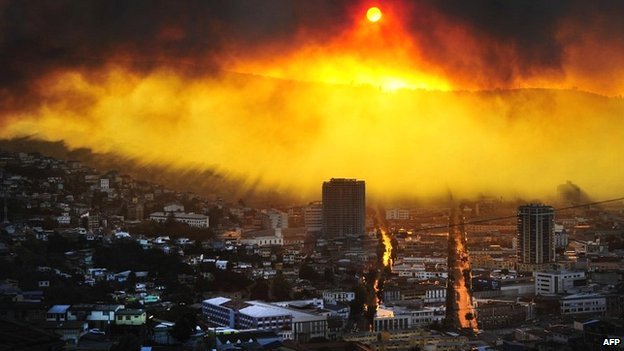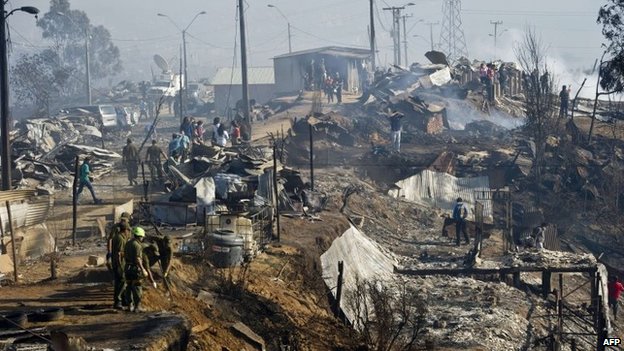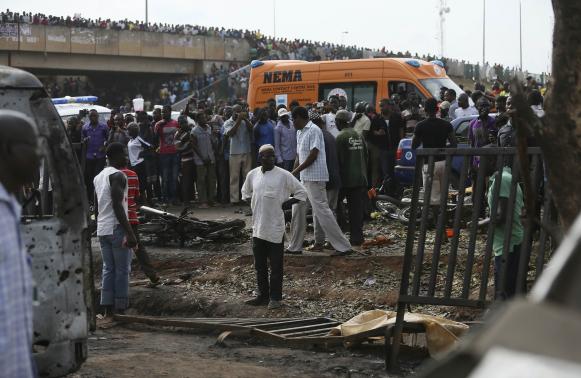redo Jump to...
print Print...
CHILE – Fire in port city kills 12 and forces thousands to evacuate
More than 10,000 people have been evacuated from Chile’s port city of Valparaiso to escape a moving fire that has killed at least 12 residents, injured some 500 more and destroyed at least 2,000 homes. Some 1,200 firefighters are battling the large blaze.

It was an apocalyptic scene as the flames covered the city in a bright glow. (Photo: AFP)
President Michelle Bachelet put the army in charge of the evacuation after declaring the city, 70 miles west of Santiago, a disaster zone. Security forces are on the streets to maintain order and prevent looting.
 One official said it was the “worst catastrophe” he had ever seen. “We fear that the fire will spread to the center of the city, which would increase the severity of the emergency,” regional governor Ricardo Bravo, a life-long resident of Valparaiso, said. The old center is a Unesco World Heritage Site, packed with old buildings that are vulnerable to fire.
One official said it was the “worst catastrophe” he had ever seen. “We fear that the fire will spread to the center of the city, which would increase the severity of the emergency,” regional governor Ricardo Bravo, a life-long resident of Valparaiso, said. The old center is a Unesco World Heritage Site, packed with old buildings that are vulnerable to fire.
Strong Pacific coast winds have pushed the fire deeper into the neighborhoods of Valparaiso, hampering the battle to contain the blaze. The city is built on a series of steep hills, separated by narrow winding streets, making the job of firefighters all the more difficult, says the BBC’s Gideon Long in Santiago.
Large parts of Valparaiso are without electricity, and residents were said to be suffering from smoke inhalation. President Bachelet is in the city to oversee an emergency committee’s response. “The people of Valparaiso have courage, have strength and they aren’t alone,” she said during a tour of the worst-hit areas. “In some places the fires have started again so we’re working on this and people will continue to be protected,” the president added.

Chile’s forestry agency said it could take more than 20 days to fully extinguish the fire
Temporary shelters have been set up for residents who were forced to flee. … Those residents who managed to return to their homes discovered that they had been destroyed. “It’s all burned down. My sister’s house also burnt to the ground,” Rosa Guzman told the Reuters news agency. Another resident said the blaze felt as if “hell encircled my family.”
“The fire raced down the hills and destroyed everything in its path,” Miguel Ramirez told the AFP news agency.
This is the second emergency that President Bachelet has had to face in the first month of her second term in office, after an 8.2 earthquake hit northern Chile on 1 April.
Fires are frequent in central Chile, where summer sends temperatures soaring.
NICARAGUA – String of Earthquakes Puts Nicaraguans on Edge
MANAGUA | Thousands of Nicaraguans woke up in the streets Monday after a sleepless night rocked by two strong earthquakes, part of a string of tremors that have kept the Central American country on edge since late last week.
A magnitude-6.1 quake Thursday evening has been followed by hundreds of small aftershocks and at least seven quakes powerful enough to send people running in panic from homes and businesses, including a magnitude-6.6 tremor Friday.
The Sandinista government has placed the country on red alert, the highest possible level, and is urging Nicaraguans to sleep outside their homes until further notice.
Life in Nicaragua, whose capital was devastated in 1972 by a magnitude-6.2 quake that killed nearly 10,000 people, has become a tense game of waiting between shakes.
In Santa Ana, a poor neighborhood a few blocks from the major fault line that crosses Managua and caused the 1972 quake, dozens of people took refuge in a bar and on the street outside after their shacks were damaged by the latest tremors.
On Sunday night, the country was hit by magnitude-4.6 and magnitude-5.6 quakes. On Monday morning, members of the 23 families sheltering at the bar moved chairs off the tables to make room for more people.
“We didn’t sleep a wink last night,” said Ana Maria Echaniz, 30. “It’s continuous anxiety, fear that comes and goes all the time.”
First lady Rosario Murillo, who is the government’s spokeswoman, said the recent seismic activity had reactivated the Managua fault, frightening city residents with memories of the 1972 quake. The U.S. Geological Survey said it could not confirm that, but said it was common for large quakes to affect nearby faults, sometimes making them more liable to cause new quakes and sometimes less so.
“We have to live on constant alert,” Murillo said Monday. “Follow our instructions. We’re still in a state of high emergency.”
A few hundred meters (yards) away, Daniela Artola, 56, checked the severely cracked walls of a motorcycle dealership that abuts her home. The building was one of the few in the neighborhood that survived the 1972 quake.
“We’re watching it. We’re scared, more than anything because of the memories of the past,” she said. “The worst is the wind in the night. Every gust of wind puts us on alert again, because it breaks the silence.”

NIGERIA – Bus station bombing kills 71 on edge of capital
A morning rush hour bomb killed at least 71 people at a Nigerian bus station on the outskirts of the capital on Monday, raising concerns about the spread of an Islamist insurgency after the deadliest ever attack on Abuja. The blast left a hole 4 feet deep in the ground of Nyanya Motor Park about 10 miles from the city center. It happened at 6:45 a.m. as people were traveling to work.
President Goodluck Jonathan pointed the finger of suspicion at Boko Haram, although there was no immediate claim of responsibility from the Islamist militants who are active mainly in the northeast. As well as the dead, police said 124 were wounded in the first attack on the federal capital in two years. … Boko Haram is loosely modeled on the Taliban movement in Afghanistan, and has forged ties with al Qaeda-linked militants in the Sahara.
Security experts suspect the explosion was inside a vehicle, said Air Commodore Charles Otegbade, director of search and rescue operations. The bus station, 5 miles southwest of central Abuja, serves Nyanya, a poor, ethnically and religiously mixed satellite town where many residents work in the city.
“I was waiting to get on a bus when I heard a deafening explosion, then saw smoke,” said Mimi Daniels, who escaped from the blast with minor injuries to her arm. “People were running around in panic.”

Crowd gather at the scene of a bomb blast at a bus terminal in Nyayan, Abuja April 14, 2014. A morning rush hour bomb killed at least 71 people at a Nigerian bus station on the outskirts of the capital on Monday, raising concerns about the spread of an Islamist insurgency after the deadliest ever attack on Abuja. (REUTERS/Afolabi Sotunde )
Bloody remains lay strewn over the ground as security forces struggled to hold back a crowd of onlookers and fire crews hosed down a bus still holding the charred bodies of commuters. “These are the remains of my friend,” said a man, who gave his name as John, holding up a bloodied shirt. “His travel ticket with his name on was in the shirt pocket.”
The attack underscored the vulnerability of Nigeria’s federal capital, built in the 1980s in the geographic center of the country to replace coastal Lagos as the seat of government for what is now Africa’s biggest economy and top oil producer.
Sixteen buses were torched in Monday’s blast and another 24 damaged, police spokesman Frank Mba said.
(The news briefs above are from wire reports and staff reports posted at BBC News on April 13, Associated Press on April 14 and Reuters on April 14.)
Questions
1. For each of the 3 countries, provide the following information:
a) capital:
b) location/the countries that share its borders:
c) the religious breakdown of the population:
d) the type of government:
e) the chief of state (and head of government if different) [If monarch or dictator, since what date has he/she ruled? – include name of heir apparent for monarch]:
f) the population:
NOTE: Before answering the questions below, read the info under “Background” and “Resources.”
2. For CHILE:
a) list the who, what, where and when of the news item
b) How many firefighters are battling the blaze? Why is the fire so difficult for them to contain?
3. For NICARAGUA:
a) list the who, what, where and when of the news item
b)What is the government response to the series of earthquakes?
4. For NIGERIA:
a) list the who, what, where and when of the news item
b) The Islamist group Boko Haram is engaging in ongoing attacks to murder as many civilians as possible because they want to impose Sharia (Muslim) law on the country. The government so far has not been successful in eradicating this group. What do you think the Nigerian government should do to stop this murderous group of Islamist terrorists?
Background
CHILE
- Sunday’s was the worst fire to hit the picturesque seaside city of 250,000 people since 1953, when 50 people were killed and every structure was destroyed on several of the city’s hills.
- While the fires were contained to the hills, President Bachelet declared the entire city a catastrophe zone, putting Chile’s military in charge of maintaining order.
- Valparaiso, which was declared a World Heritage Site by UNESCO in 2003, is known for colorful neighborhoods hugging hills so steep that people have to use staircases rather than streets.
- It is about 75 miles northwest of the capital, Santiago, has a vibrant port and is home to Chile’s national legislature.
- But many homes in densely populated poorer areas above the city centre have been built without water supplies or access points wide enough for fire trucks, so much of the fight was from the air. (from reuters)
NIGERIA – Islamist terrorist group Boko Haram:
- Boko Haram, which means “Western education is a sin” in the Hausa language, is fighting to impose Islamic law in Nigeria, Africa’s biggest oil producer. Attacks have continued after President Goodluck Jonathan imposed emergency rule in Borno, Yobe and Adamawa states last May.
- The United Nations estimates that the Islamic uprising has forced some 300,000 people to leave their homes since 2010 in northeast Nigeria, most displaced within the country and some across borders in Chad, Cameroon and Niger.
- At the end of March 2014, Nigeria’s Borno state government closed all high schools indefinitely amid fears of massive attacks by Islamic extremists, officials and teachers said, confirming a move that may be considered a victory for the Islamic extremist Boko Haram terrorist network. Amnesty International said Boko Haram Islamists killed at least 170 students and teachers last year (and the militants also burned down more than 50 schools in the region in the past year, according to the Education Ministry).
- Officials said some 85 schools will be closed, affecting nearly 120,000 students in an area that has the country’s worst literacy rates. They ‘‘are to remain closed until the security situation in the state improves,’’ Borno state Gov. Kashim Shettima said Monday on the BBC Hausa language service.
- Other schools fearful of attacks have closed in Yobe and Adamawa states.
- While violence has torn the northeast where Boko Haram has killed thousands, the capital in the middle of Africa’s most populous country has been relatively peaceful.
- Two notable exceptions occurred when Boko Haram members rammed two explosives-laden cars into the lobby of the United Nations office building in 2011, killing at least 21 people and wounded 60 and when militants from the southern oil-producing Niger Delta in October 2010 exploded two car bombs at Independence Day celebration, leaving at least 12 people dead and 17 injured. The Movement for the Emancipation of the Niger Delta which carried out that attack has been largely dormant since then, except for some sabotage of oil pipelines.
- There was no immediate claim for Monday’s bombing though bus stations are a favored Boko Haram target. In March 2013, the extremists drove a car bomb into the main bus station in Kano, Nigeria’s second biggest city, killing at least 25 people.
IN a SEPARATE ATTACK by Boko Haram last week:
- Islamist militants Boko Haram killed at least 60 people in an attack on a village in northeast Nigeria, while a separate attack killed eight people at a teacher training college, witnesses said.
- Witnesses said the gunmen attacked the village of Kala Balge, near the Cameroon border, on Thursday (April 10), from several different quarters, shooting sporadically as terrified residents tried to flee.
- “I’m making efforts to evacuate my parents from the town,” said Ibrahim Bukar, 35, after escaping the attack. He said he counted 60 bodies scattered around after the insurgents left. Most have since been buried by the villagers, he said.
- In a separate assault, insurgents killed eight people at a teacher training college in the remote village of Dikwa on Wednesday, witnesses said. “They entered at night. They killed my brother Madu. The insurgents shot him in front of his wife and two sons. Then they shot them, too,” Yakubu Saleh said, choking back tears over the telephone.
- President Goodluck Jonathan ordered extra troops into northeast Nigeria last May to try to crush the rebels, the biggest security threat to Africa’s top oil producer.
- But the rebels have retreated into the remote, hilly Gwoza area, bordering Cameroon, from where they have stepped up their campaign, mounting deadly attacks against security forces and civilians they accuse of being pro-government. (from an April 13 reuters report)
Daily “Answers” emails are provided for Daily News Articles, Tuesday’s World Events and Friday’s News Quiz.



